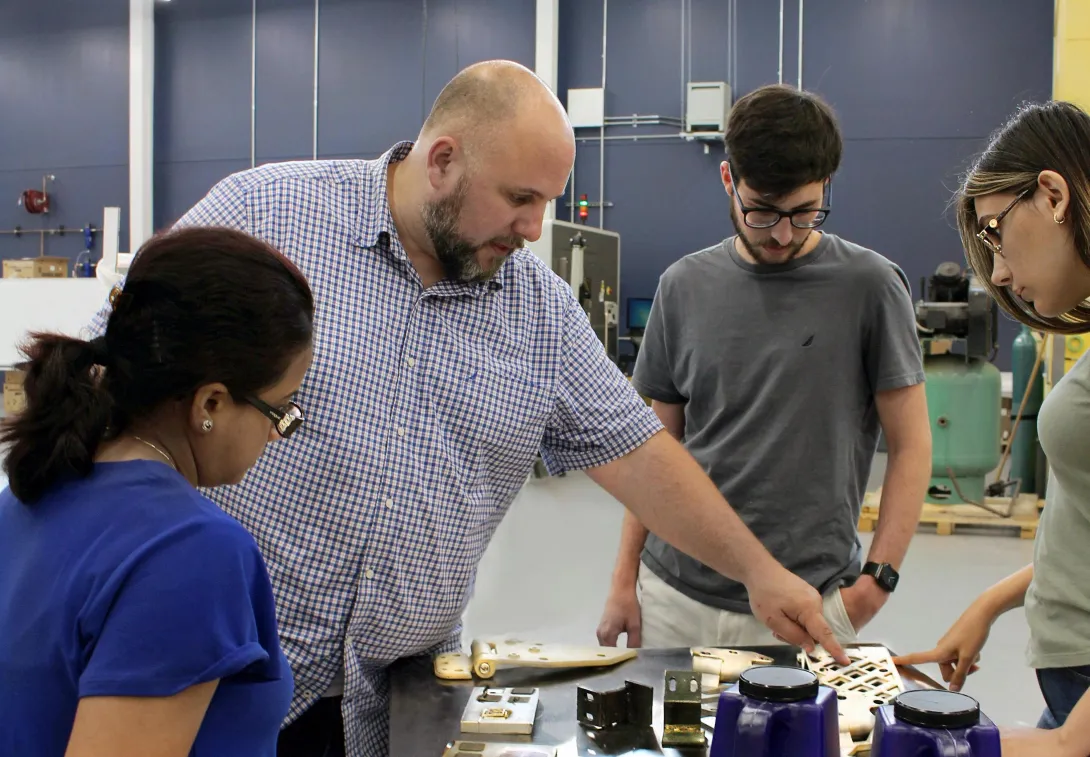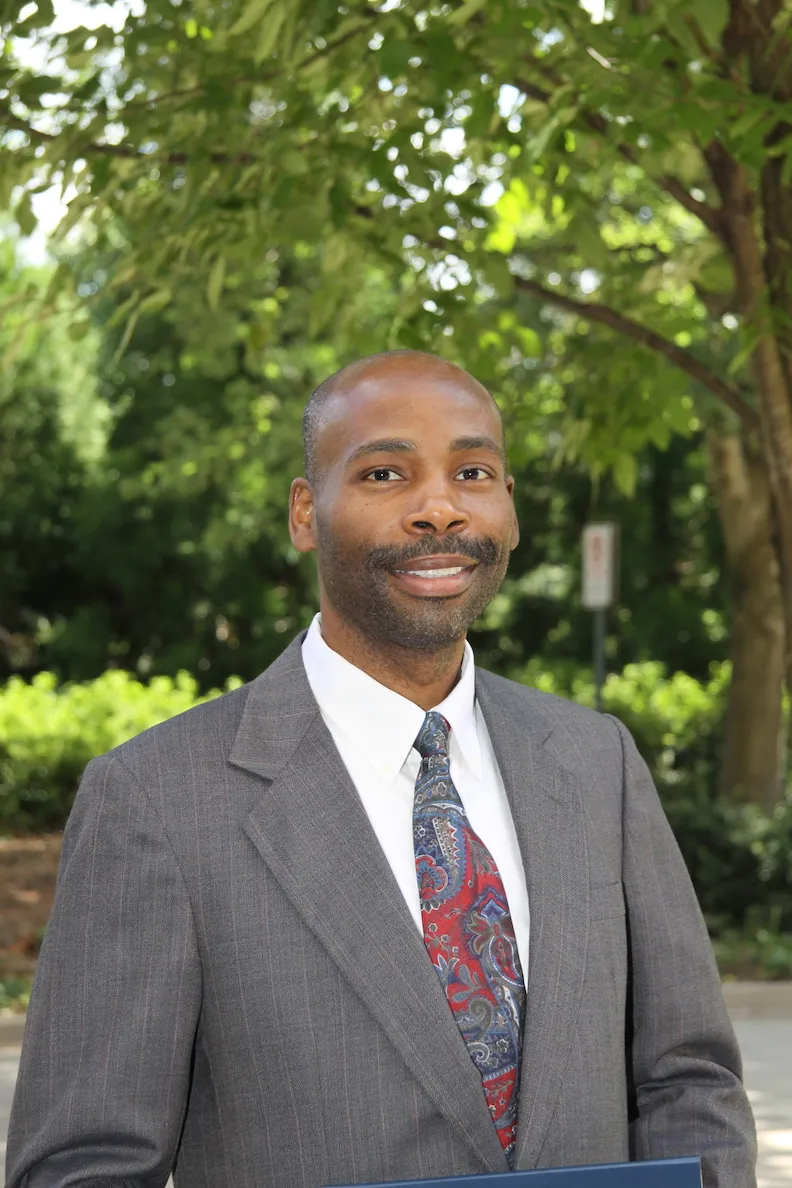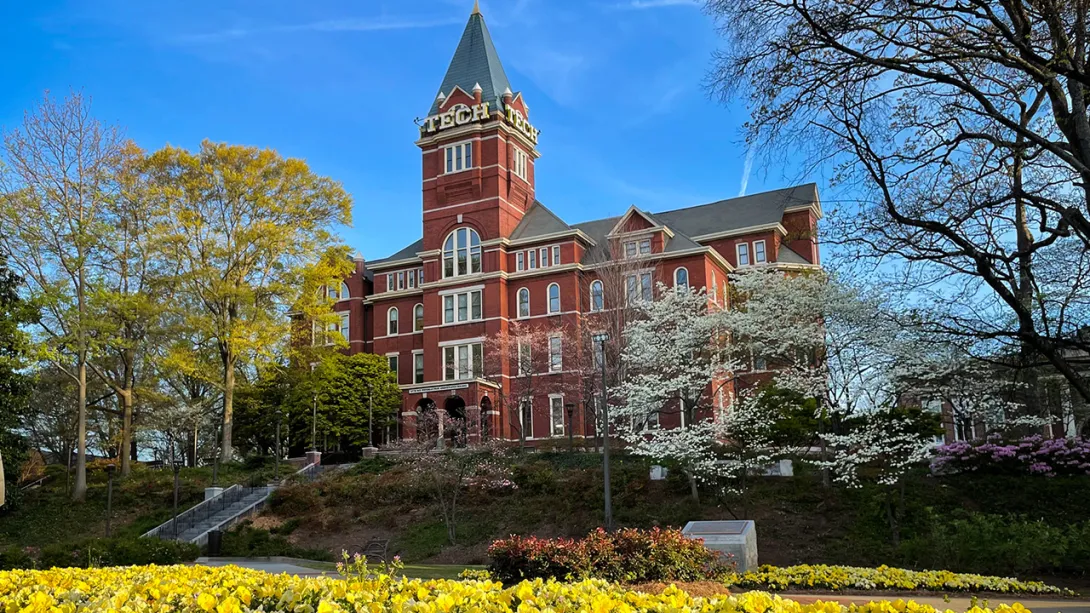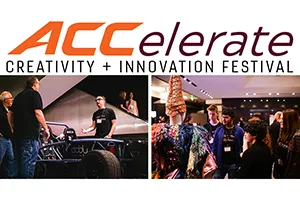Dec. 16, 2021
The global supply chain has been rocked by disruptions triggered largely by the coronavirus pandemic, resulting in a cascade of shortages on a host of products ranging from computer chips to medications.
But supply chain disruptions also highlight the potential vulnerabilities in the U.S. manufacturing sector’s critical segments like defense.
To help manufacturers across the state, the Georgia Institute of Technology has launched the Georgia Manufacturing 4.0 Consortium to work with those businesses in defense and related industries become more resilient and less susceptible to supply chain disruptions. The Consortium, which will begin accepting members in April 2022, will work with Georgia defense manufacturers to incorporate cybersecurity protocols, smart technologies such as sensor packs, machine learning, artificial intelligence, and other best practices under Industry 4.0 technology standards.
Led by Aaron Stebner, associate professor in the George W. Woodruff School of Mechanical Engineering and the School of Materials Science and Engineering, the Consortium is an 18-month pilot funded by a Department of Defense Office of Local Defense Community Cooperation (OLDCC) grant of nearly $1 million. Georgia Tech is working in partnership with Spelman College, the Technical College System of Georgia, and the Georgia Department of Economic Development, under the grant to develop workforce, training manuals, a curriculum, and to support businesses in adapting to economic and technological changes that emerge at a much more rapid pace today.
“It’s a cooperative effort that’s really focused on helping to get modern technologies to these Georgia manufacturers. This is about establishing a community of manufacturers who all want to move forward but don’t have the bandwidth or capabilities do it individually,” Stebner said.
The Consortium has three goals. The first is to increase the manufacturing defense supply chain’s resilience and diversification. That will allow those companies to pivot quickly in response to demand and let non-defense-related industries enter the supply chain at critical junctures. The second goal is to work with Georgia manufacturers in adopting new technologies and address challenges that put those businesses at risk.
Lastly, the Consortium is to be a conduit that helps small- and medium-sized manufacturers test out innovations using Georgia Tech resources such as the Advanced Manufacturing Pilot Facility, connect manufacturers with each other, and potentially unlock new markets and collaboration opportunities.
While the focus is on defense manufacturing, the Consortium is open to all manufacturers.
“We want to help as many manufacturers as we can, to grow a bigger pie that helps everybody, lowers risk, and allows companies to be part of building innovative solutions” Stebner said.
Manufacturing Supports Georgia Economy
National Association of Manufacturers data show that manufacturing accounts for $61.1 billion in economic activity, roughly 10% of Georgia’s total output. The industry includes more than 6,600 firms that employ nearly 400,000.
At $14 billion a year, Georgia is ranked 13th in federal defense spending. Roughly 1,200 manufacturers in the state are in defense or related industries. Those include information technology companies that support cybersecurity, wireless communications, and other innovations that are critically essential to Industry 4.0 in defense manufacturing.
University partners from the Technical College System of Georgia and Spelman College will look to take the Consortium findings and data from the work they do with member companies to create educational programming and workforce training.
Today, there is a need for more workers in machine learning and other aspects of advanced manufacturing, as well as a need to change perceptions of manufacturing, especially in rural parts of the state, Stebner explained.
To that end, the Technical College System of Georgia could develop programming for students within its two-year education curriculum. It also has a mobile manufacturing unit that could be taken to rural parts of the state and used as a tool to highlight opportunities in manufacturing and dispel misconceptions about the industry.
The all-women’s Spelman College, one of the nation’s premier historically black colleges and universities, launched an extended reality program in the fall of 2020. That program aims to integrate art, technology, and narrative on a gaming platform which is familiar and engaging for students. Those students will develop the technical skills to develop games, create immersive virtual experiences, and develop visual simulations for research, education, and training.
For Consortium members, Spelman’s extended reality program can be used to help turn research data gathered from them into workforce training and development modules.
“Spelman has a long history of graduating women in the natural sciences, and that history has recently led the Department of Defense to distinguish the College as a Center of Excellence for educating women in STEM,” said Jerry Volcy, a Spelman professor and co-director of the Spelman Innovation Lab.
The extended reality program furthers Spelman’s goal to increase the technological readiness of its graduates.
“Spelman has a long record of forging pathways for women of color into new spaces. Today, these spaces include extended reality, defense and, to some extent, manufacturing research,” Volcy said. “From the College’s perspective, participation in the Consortium has the dual potential of creating and discovering new pathways into these industries while immediately providing real-world applications laboratory for the developing extended reality program.”
Fulfilling Georgia Tech’s Mission
Within Georgia Tech, the Georgia Manufacturing Extension Partnership and the Georgia Tech Manufacturing Institute will support Consortium efforts.
The Consortium reflects Georgia Tech’s broader mission to further its Advanced Manufacturing Initiative, said George White, Georgia Tech’s interim vice president of Industry Collaboration.
“The anticipated research impact envisioned through the Defense Manufacturing Consortium will strengthen Georgia Tech’s positioning in enabling major public private collaborations,” White said. “The advent of the Consortium represents the opportunity to convene key stakeholders from government, academics, and industry to innovate and solve the most challenging problems in manufacturing.”
News Contact
Writer and media relations contact:
Péralte C. Paul
peralte.paul@comm.gatech.edu
404.316.1210
Nov. 13, 2020
Industrial Internet of Things in 2020 was presented by Alain Louchez at the IoT for Manufacturing Symposium organized by the Factory Information Systems Center at the Georgia Tech Manufacturing Institute on November 11, 2020.
For a full activity report please see: https://cdait.gatech.edu/Activities/Industrial_Internet_of_Things
May. 28, 2020
IDEaS recently awarded a series of grants to stimulate the research efforts of Georgia Tech’s brightest minds in data science and related disciplines. Faculty and student research programs targeted for IDEaS awards must demonstrate research goals that will be highly cross-disciplinary and emphasize how data science can assist in related research areas.
The Data Science Research Scholarships program will support scholarships for the Spring 2020 semester and focus on Ph.D. student research that enables new collaborative research or adds a data science dimension to established research projects. Each scholarship will fund 50% of the cost of a GRA appointment, with the project PI funding the remaining 50%.
Data Science Research Scholarships 2020 Awards
- JC Gumbart (Physics) & David Sherrill (Chemistry): Force-field Development to Enable Simulations of Xeno-nucleic Acids
- Xiuwei Zhang (CSE) & Haesun Park (CSE): Development of an Integrative Clustering Method for Single Cells
- Vince Calhoun (ECE) & Audrey Duarte (Psych): The Chronnectomics of Memory
- Annalisa Bracco (EAS), Jie He (EAS) & Matt J. Kusner (University College London): Machine-learning Techniques for Cloud Modeling
- Toyya Pujol-Mitchell (ISYE), Nicoleta Serban (ISyE) & Constantine Dovrolis (CS): Network Weight Prediction Using Node Attributes
- Xiaofan Liang (City & Reg Planning), Clio Andris (City & Reg Planning) & Diyi Yang (IC): Advancing Metrics for Spatial Social Networks in the Era of Big Data
- Omar Asensio (Public Policy): Do Micromobility Options Reduce Traffic Congestion? Quasi-experimental Evidence from Uber Movement Data
- Constantine Dovrolis (CS) & Kelly F. Ethun (Emory/Yerkes): Connections Between Social Behavior and Food Intake in Rhesus Macaques
- Diyi Yang (IC) & Mai ElSherief (IC): Defining, Characterizing, and Detecting Implicit Discriminatory Speech Online
- Umakishore Ramachandran (CS) & Zhuangdi Xu (CS): Generating Labeled Vehicle Tracking Dataset for Large-scale Geo-Distributed Camera Networks
- Surya R. Kalidindi (ME/CSE/MSE) & Christopher Saldana (ME): Advanced Materials-Manufacturing Data Curation
- Agata Rozga (IC), Thomas Ploetz (IC) & external: Annotation of Datasets from Severe Behavior Treatment Program at the Marcus Autism Center
Data Science Partnership 2020 Awards
- Diyi Yang (IC): Allen Institute for AI and University of Washington
- Josh Kacher (MSE): Lawrence Livermore National Laboratory
- Rachel Cummings (ISyE): Georgetown University and U.S. Census Bureau
Data Science Speaker Travel Awards supports visits to the Georgia Tech campus by external experts in the areas of data science foundations or data-driven discovery in any discipline. Funds may be used to host a guest speaker for the IDEaS seminar series, or to participate in another on-campus event, conference, or seminar series. Awardees’ invited guests are experts in either mathematical data science or data science engineering.
Data Science Speaker Travel 2020 Awards
- Betsy DiSalvo (IC): Data Work Civic Engagement Panel
- Diyi Yang (IC): Natural Language Processing/Computational Social Science Seminar
Apr. 13, 2020
Georgia Tech Arts is still seeking projects for the 2021 ACCelerate: ACC Smithsonian
Creativity and Innovation Festival in Washington, DC. All Georgia Tech students, faculty, and staff are invited to apply by May 1, 2020.
Even if you do not have a finished project exploring the intersection of science,
engineering, art, design, and technology, we encourage you to speak with Es
Famojure at esther.famojure@arts.gatech.edu about your concepts.
Learn about Georgia Tech's 2019 participants for some inspiration.
The festival brings together all institutions included in the Atlantic Coast Conference to
celebrate creativity and innovation with a specific focus on science, engineering, arts, and
design. It will be held April 9 -11, 2021 at the Smithsonian National Museum of American
History.
Submit your project for consideration by May 1, 2020 to be considered.
News Contact
Es Famojure
esther.famojure@arts.gatech.edu
Pagination
- Previous page
- 7 Page 7




